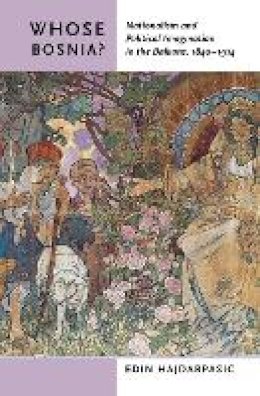
Stock image for illustration purposes only - book cover, edition or condition may vary.
Whose Bosnia?: Nationalism and Political Imagination in the Balkans, 1840–1914
Edin Hajdarpasic
FREE Delivery in Ireland
Description for Whose Bosnia?: Nationalism and Political Imagination in the Balkans, 1840–1914
Hardback. Num Pages: 288 pages, 14, 11 black & white halftones, 3 maps. BIC Classification: 1DVWYB; 3JH; HBJD; HBLL; HBLW. Category: (G) General (US: Trade). Dimension: 235 x 156 x 23. Weight in Grams: 542.
As Edin Hajdarpasic shows, formative contestations over Bosnia and the surrounding region began well the assassination that triggered World War I, emerging with the rise of new nineteenth-century forces—Serbian and Croatian nationalisms, and Ottoman, Habsburg, Muslim, and Yugoslav political movements—that claimed this province as their own. Whose Bosnia? reveals the political pressures and moral arguments that made Bosnia a prime target of escalating nationalist activity.
Hajdarpasic provides new insight into central themes of modern politics, illuminating core subjects like "the people," state-building, and national suffering. Whose Bosnia? proposes a new figure in the history of nationalism: the (br)other, a ... Read morecharacter signifying the potential of being "brother" and "Other," containing the fantasy of complete assimilation and insurmountable difference. By bringing this figure into focus, Whose Bosnia? shows nationalism to be a dynamic and open-ended force, one that eludes a clear sense of historical closure.
Show Less
Product Details
Publisher
Cornell University Press United States
Place of Publication
Ithaca, United States
Shipping Time
Usually ships in 15 to 20 working days
About Edin Hajdarpasic
Edin Hajdarpasic is Associate Professor of History at Loyola University Chicago.
Reviews for Whose Bosnia?: Nationalism and Political Imagination in the Balkans, 1840–1914
Scholars of the Balkans and beyond, have been waiting for an account like this for a long time—an account that is not afraid to ask difficult questions; approach them studiously, seriously, and in an interdisciplinary fashion; and answer them in a way that is supported by vast amount of evidence, grace, and honesty.
H-SAE
Elegantly written and full ... Read moreof unexpected (re)readings and provocative insights, this work towers over the already respectable stack of books on the cultural history of nationalism. What makes this work attractive is the wide culture and sophistication displayed, the ease with which Hajdarpasic moves from literary to philosophical allusions, the erudite interdisciplinary sweep, from anthropology to sociology and political science. This, more than the 'grounded theory,' really 'de-provincializes' its subject, and makes the work an important contribution not only to East European literature broadly, but to nationalism studies in general.
Austrian History Yearbook
A remarkably refreshing study that conveys clearly just how difficult it was for activists and governments not only to implant national consciousness in people largely indifferent to the idea, but, once they had done so, to guide its growth along lines that they could control.... Hajdarpasic's work makes an extremely valuable contribution to our understanding of the nineteenth-century Balkans and the roots of the fixation on nationalism evident in this area of history. It also should interest scholars in the wider field of nationalism studies, as it adopts an empirically grounded theoretical approach centered not only on the concept of the (br)other but on the open-ended nature of nationalism, which neither is controllable nor has any clear endpoint.... Hajdarpasic's work sets a new standard in modern Balkan history and should become a pillar of the field.
The American Historical Review
This is an impressive book, complex and challenging.... well-crafted, compellingly written, and extensively researched. It is probably the most important text to have been published on this subject in the English language.
Slavic Review
As a former Bosnian now living in the US, [Hajdarpasic] seeks a new paradigm—conceptually innovative and historical in its methodology—to obviate the vicissitudes of internecine nationalism in Bosnia.... Recommended.
Choice
A much-needed contribution that helps us understand not only contemporary Serbian and Croatian aspirations towards B-H, but also the roots of many notable artistic and cultural productions about the region.... An excellent historiographic work.
Slavic and East European Journal
Hajdarpasic's book is timely and relevant, not only in what it has to tell us about the binary nature of debates about national identity in the period treated by the book but also in southeastern Europe today.... The book also functions very well as a cultural history of Bosnia and Herzegovina and tackles an impressive number of literary and artistic works.... A very valuable and welcome addition to the English-language historiography of Bosnia and Herzegovina, specifically, and of the Balkans and nationalism studies more generally.
The Journal of Modern History
Hajdarpasic has written an insightfully nuanced, relevant and very much archival source- based monograph on transnational Serbian, Croatian and Bosnia-Herzegovina intellectual discourses during the long nineteenth century. His point of reference is an extraordinary spec- trum of nationalists – ethnographers, insurgents, teachers, academics, poets, politicians, and other actors often grouped together as intellectuals – who dreamed about and vied for the right to call Bosnia their own.... Hajdarpasic has contributed a valuable, exquisitely creative and in- sightful journey into the "South Slav problem" by southern European minds.
Jahrbcher fr Geschichte Osteuropas
Hajdarpasic's engagingly written book is a welcomed contribution to the studies of nationalism in general and late imperial Bosnia in particular. He successfully demonstrates how the writings of many national activists are studded with inconcsistencies, contradictions, half-knowledge, insults, irrational eruptions, expressions of hatred, calls for violent actions, and absurdities.
Südost-Forschungen
Hajdarpasic has produced a work throwing valuable light on nationalist thinking in Bosnia-Herzegovina in the nineteenth and early twentieth centuries, one that will be a resource for all future scholars of the subject.
English Historical Review
Show Less

